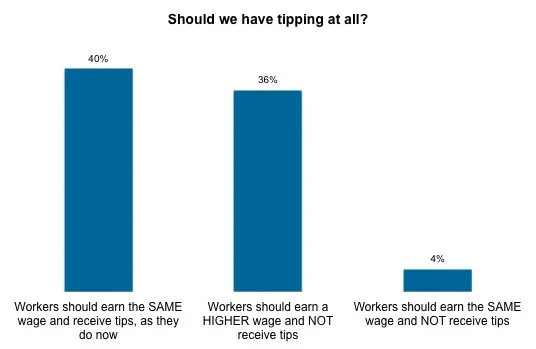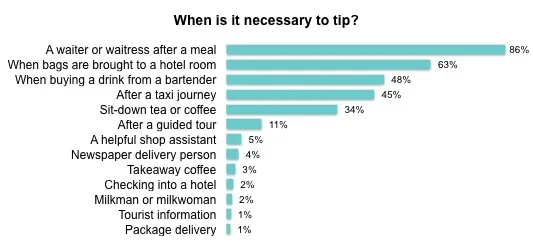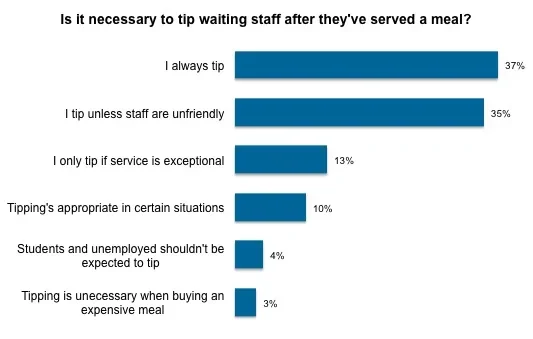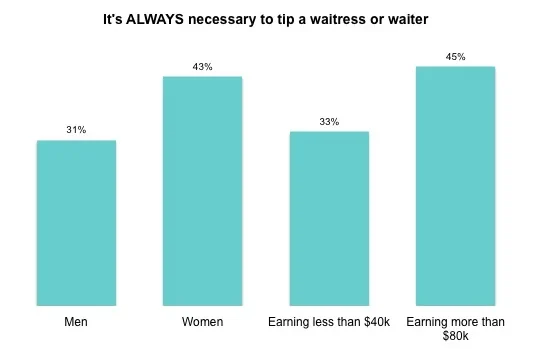It is one of America’s defining customs that many service providers – from bellboys to barmen – receive a small gratuity for doing their job well. But as Americans are making cutbacks and budgets remain tight, do we think tipping is necessary?
36% say we should not be expected to tip at all, but that workers should receive higher wages instead. The most polled answer (40%) was for the custom to tip to remain in place. Either way, the cost of service is passed over to the customer – unless you’re one of the 4% who say workers should not receive tips, but should be paid the same as they are now.

When to tip
Tipping isn’t a legal requirement, but the vast majority (86%) of Americans think it is necessary to tip a waiter or waitress after being served a meal. Although many waiting staff may receive less than the federal minimum wage of $7.25 per hour, customers are generally expected make up their pay packet with a voluntary gratuity. Tipping really is like an added tax in that – even though diners aren’t obliged to pay – it is an important part of staff income and is subject to income tax.
But Americans are less sure over the tipping etiquette for a hotel bellboy, bartender, taxi driver or barista. While 63% of us think someone bringing bags up to a hotel room deserves a tip, only 45% think a taxi driver is justified in expecting more than their fare.
Cabbies come in at the fourth most-tipped service providers, as 45% thought their service warranted a tip. But only the minority of Americans (5%) thought a helpful shop assistant, the newspaper delivery person (4%) or a milkman (2%) should expect to receive a tip.

Leaving two cents side by side is the traditional way for a customer to show they’re unhappy with the service they received. The best way for a waiter or waitress to avoid this is to offer a friendly service, according to the American public. Although 37% said they would always tip someone who served them a meal, 35% said an unfriendly member of staff wouldn’t receive a gratuity. 13% said service would have to be exceptional to warrant a tip, while 4% said that students and unemployed people shouldn’t be expected to pay more than the bill.

Higher earners have higher scruples when it comes to tipping waiting staff – 45% of Americans earning more than $80,000 per year said it is always necessary to tip a waitress or waiter, compared with 33% among those earning less than $40,000 per year. Men are also more likely to refuse to tip – 31% said it is always necessary to tip the person bringing the food, less than the 43% of women who thought so.

Perhaps tipping is being seen as a more old-fashioned custom, as older Americans were the age group most polled to tip a member of staff. 91% of those aged 55 and over would tip a waitress, compared with 80% among 18-34 year olds. While only 48% of millenials tip someone who brings their bags to a hotel room, 77% aged 55 and over would do so. A tour guide could expect to receive a tip from 18% of the older age group, compared with just 4% 18-34 year olds.
Some less-polled tipping customs include giving a Christmas bonus to the mail carrier, or tipping a hairdresser, a hotel maid, the pizza delivery person, trash removers, a car cleaner and a taxi driver if the luggage is particularly heavy. A handful of respondents said it depended completely on the service, showing just how variant tipping etiquette can be.
Do you agree tipping should remain, or is it time to change the American custom? Or are you a worker who’s received an unusually large or insultingly small tip? Leave your comments below.
Find the full results here.









